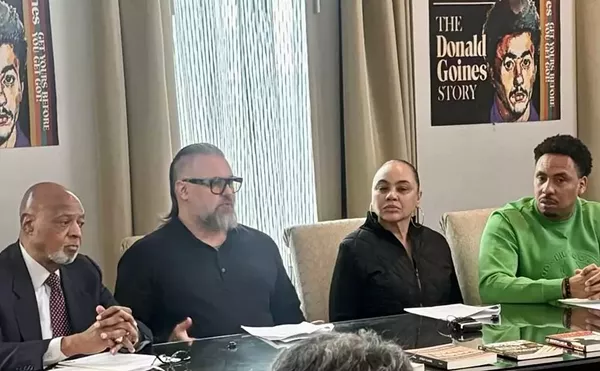Hey there, pilgrim: If CNN’s version of the war so far — old-soldier analysts, embedded talking heads and carefully disinfected footage — is starting to feel a little weird, maybe what the brain doctor ordered are a few more truthful visions of mortal combat and its aftereffects.
Most war movies being patriotic and pro-war, they tend to resemble a Red Wings highlight film after a Stanley Cup run. The hated enemies keep trying to bring the home team down with sneaky acts of evil and brutality, but our heroes, after tottering at the brink of disaster, rally to win the day. As John Wayne put it in The Longest Day, “You can’t give the enemy a break. Send them to hell.”
By any of the rules of engagement and survival, the Duke was right. Except that he never gave sports fans back home a glimpse of what ritualized murder is really like, what it does psychologically and spiritually to the combatants and what kind of an abbreviated future it might be preparing for our kids.
Yet some of the greatest film directors of the last century have done just that. The following is a video-rental checklist of 25 of the best anti-war movies of all time:
Hell on earth
Here are 10 guided tours worthy of Dante and the Marquis de Sade — visions of such destruction, suffering and terror as to give pause to all but the most psycho-patriotic:
All Quiet on the Western Front (1930, dir. Lewis Milestone)
Milestone’s early sound film stunned audiences with its awesomely realistic battle sequences. But this American production’s real originality was in showing the horrors of World War I trench warfare from the German point of view — an act of compassion only possible 12 years after the end of hostilities.
Paths of Glory (1957, dir. Stanley Kubrick)
The first of three films that Kubrick would make on the insanity of war, Paths is based on a true, gut-wrenching tale of World War I. Kirk Douglas stars as a French officer trying to defend his men from the lethal egoism of his commanding officer.
Fires on the Plain (1959, dir. Kon Ichikawa)
A lone Japanese soldier in the Philippines witnesses the extremes that defeated men go to in order to survive — beginning with the cannibalism of corpses, then by hunting each other for food.
The War Game (1965, dir. Peter Watkins)
This relatively short (48 minutes) but notorious fictional depiction of the effects of a nuclear bomb on a small English town is so scary, it was initially suppressed by British TV. As the truth of the town’s predicament sinks in, the civilized turn to barbarism.
The Deer Hunter (1978, dir. Michael Cimino)
In Cimino’s controversial, deeply disturbing vision of the Vietnam War, the idea of combat is diverted into a gruesome game of Russian roulette. Christopher Walken, in a haunting, Oscar-winning performance, changes from everyday Joe to suicidal compulsive.
Apocalypse Now (1979, dir. Francis Ford Coppola)
Coppola’s nightmarish Vietnam War symphony brings Joseph Conrad’s Heart of Darkness into the 20th century. After a breathtaking, mind-boggling series of grisly episodes, Martin Sheen and Marlon Brando face off in the eerie climax.
Full Metal Jacket (1987, dir. Stanley Kubrick)
This devastating two-part ballad of the U.S. Marine Corps starts out with the numbing rigors of boot camp and culminates in the battle for Hue during the Tet Offensive, with stark, almost surreal footage that Vietnam vets have corroborated as being the way it was.
Bosna! (1994, dir. Alain Ferrari and Bernard-Henri Lévy)
In this unbelievably vivid, investigative documentary, the genocidal war in Bosnia-Herzegovina becomes a history lesson about 20th century Europe. French philosopher Lévy contributes a sobering voice-over narrative.
The Thin Red Line (1998, dir. Terrence Malick)
A large cast of familiar faces confronts death, despair and dislocation on Guadalcanal in World War II. Malick’s long-awaited return to filmmaking is something like a Buddhist meditation on warfare, particularly on the ways humanity devastates the natural order of things.
The Pianist (2002, dir. Roman Polanski)
Polanski’s masterful direction and Adrien Brody’s Oscar-winning acting are just two reasons to see this intensely personal treatment of the Holocaust. Suffused with a cold-blooded directness and intimacy, it’s the true story of one man’s odyssey through Nazi hell.
Aftermaths
Much of war’s effect on its survivors tends to be hidden from public view. Here are seven films that deal with physical and psychological trauma in the lives of those who’ve run its gauntlet.
The Men (1950, dir. Fred Zinnemann)
Young Marlon Brando, in his first movie role, gives a strong performance as a World War II vet in a wheelchair whose simpatico girlfriend, played by Teresa Wright, helps bring him back from the depths of depression.
Hiroshima, Mon Amour (1959, dir. Alain Resnais)
Based on Marguerite Duras’ adaptation of her own novel, this tale of postwar longing and grief folds one extreme into another — contrasting almost unwatchable re-enactments of the Hiroshima tragedy with timeless images of desire among the ruins.
Johnny Got His Gun (1971, dir. Dalton Trumbo)
Trumbo’s chilling film answers questions nobody dares to ask: How much injury can a body sustain and still survive? And would such a “life” be worth it? A World War I soldier and bombing victim — legless, armless, deaf, dumb and blind — dreams of better days.
Coming Home (1978, dir. Hal Ashby)
The film that shook a nation, this heartrending story of the Vietnam aftermath in America stars Jane Fonda and Jon Voight (who, as a wheelchair-bound vet, gives an unforgettable speech to high school kids about war). More than defining a decade, it distilled antiwar awareness to its essence.
Birdy (1984, dir. Alan Parker)
Birdy’s antiwar theme is like a picture frame. The trauma of battle is at the edges of a story, told largely in flashback, about the high school friendship of two working-class kids, one of whom returns from Vietnam physically maimed, the other a catatonic who flew from the horror of war by escaping into an alternate psychic world. Intense, compelling and ultimately uplifting.
Born on the Fourth of July (1989, dir. Oliver Stone)
In the most effective installment of Stone’s Vietnam “trilogy” (after Platoon and before Heaven and Earth), Tom Cruise portrays real-life Vietnam vet Ron Kovic, whose combat experiences transform him from an idealistic recruit to a paraplegic in a wheelchair to a radicalized opponent of the war.
Life and Nothing But (1989, dir. Bertrand Tavernier)
In the aftermath of World War I, on the corpse-strewn fields of France, two women search for evidence of the men they love. Philippe Noiret, one of France’s finest actors, plays the disillusioned officer who tries to help them. Pervading this beautifully photographed film is an unbroken tone of mourning.
Grim laughter
One of the few responses that French, English and American directors of the ’60s could muster to the awful absurdity of the Cold War was black humor.
Les Carabiniers (1963, dir. Jean-Luc Godard)
Never much of a realist, avant-garde director Godard turned this tale of everyman warriors into a cynical elbow in society’s ribs. Following his lowly anti-heroes as they stumble from greedy opportunism to war crimes and worse, he turns The Soldiers (translation) into cinematic theater of the absurd.
Dr. Strangelove (1964, dir. Stanley Kubrick)
Making masterful use of the multitalented Peter Sellers, Kubrick freaked out audiences with this black-and-white ghoul show about Cold War madness and the nuclear arms race gone dreadfully wrong. The “humor” of the endgame sequence is pretty close to unbearable.
How I Won the War (1967, dir. Richard Lester)
The gem in this mostly lukewarm satire of British militarism is John Lennon’s small but poignant role as a hapless doughboy. When he gets snuffed out, we get a taste of sadness to come.
Catch-22 (1970, dir. Mike Nichols)
Joseph Heller’s darkly comic novel about the misadventures of American pilots in World War II comes to the screen with its satirical bite intact. This quintessential saga of deadly snafus and lethal systemic fuck-ups made its title into a universal code word for modern times.
M*A*S*H (1970, dir. Robert Altman)
The kernel that spawned the hit TV series, Altman’s wildly, horribly comic vision of Korean War excesses gave a new face to the medical profession as we know it. But all’s fair in sex and war, as this flipped-out flick proves again and again.
Flawed but moving
Sometimes even the best intentions get sidetracked, though these movies still pack a wallop.
Platoon (1986, dir. Oliver Stone)
The first installment of Stone’s Vietnam trilogy is saturated with grisly combat scenes that drive home a powerful point: War sucks. But somehow it all gets redeemed in the end.
Saving Private Ryan (1998, dir. Steven Spielberg)
The first 25 minutes of this epic are probably the most violent battle scenes ever filmed — an awesome mix of heroism and carnage, terror and pathos. But the finale — with Tom Hanks shooting his pistol at a German tank and a fighter plane miraculously coming to the rescue — is John Wayne fantasyland all over again.
Black Hawk Down (2001, dir. Ridley Scott)
Combat veterans say that this is what it’s really like, with hot metal flying, bodies dropping and the Grim Reaper cutting a swath in a terrible game of chance. But Scott omits the larger political context and obscures the motives of both the Americans and their demonized enemies.
George Tysh is the Metro Times arts editor. E-mail [email protected]





